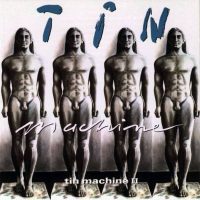 Recorded: September – November 1989; April, September – October 1990; March 1991
Recorded: September – November 1989; April, September – October 1990; March 1991
Producers: Tin Machine, Tim Palmer, Hugh Padgham
Released: 2 September 1991
Personnel
David Bowie: vocals, guitar, piano, saxophone
Reeves Gabrels: guitar, vocals, organ
Tony Sales: bass guitar, vocals
Hunt Sales: drums, percussion, vocals
Tim Palmer: piano, percussion
Kevin Armstrong: guitar, piano
Contents
Tracklisting
- ‘Baby Universal’
- ‘One Shot’
- ‘You Belong In Rock N’ Roll’
- ‘If There Is Something’
- ‘Amlapura’
- ‘Betty Wrong’
- ‘You Can’t Talk’
- ‘Stateside’
- ‘Shopping For Girls’
- ‘A Big Hurt’
- ‘Sorry’
- ‘Goodbye Mr Ed’
- ‘Hammerhead’
The follow-up to 1989’s Tin Machine album, Tin Machine II saw David Bowie and his band continuing their uncompromising vision of back-to-basics rock music.
In the studio
The bulk of Tin Machine II was recorded in 1989 in Australia, in the wake of the band’s first tour. The sessions took place from September to November 1989 at Studios 301 on Castlereagh Street, Sydney.
I think I might have been pushed into it from Reeves Gabrels. He really was eager for us to solidify the band and I think I got caught up in his enthusiasm. It was very exciting to work with those guys.We decided when we formed that we’d play it from album to album, that if we were still getting on with each other – which was the priority – that we’d continue. and so far it’s going great. So if after the next tour we’re still enjoying the process, we’ll go in again and keep recording. It’s a good search: we’re finding a lot out about ourselves and it’s given me a feeling for what I want to do again as a solo artist, no doubt about it. So I definitely think I’ll be fitting in some solo work next year.
Q magazine, April 1990
After an impromptu show in Sydney on 4 November 1989, Tin Machine went on a temporary hiatus as Bowie prepared for a solo tour and to star in the film The Linguini Incident.
The Sound + Vision tour opened in Canada on 4 March 1990, taking in five continents in seven months before concluding in Argentina on 29 September 1990. For his part, Bowie claimed the tour would be the last time he would play some of his biggest hits – a circumstance he had mixed feelings about.
I was so ambivalent about that. It was really hard. But it did two things for me. One, the money was so big that I would have been stupid not to do it. Two, it was a good way of me stopping that side of what I’ve done. For a long time, I’ve wanted to stop f*****g doing those songs. I mean, it’s really hard for me to get it up for ‘Major Tom’ at this point. I absolutely loathe singing ‘Young Americans’. So I killed two things off that way. Yet it was a gamble that it wouldn’t do irreparable harm to the band. But knowing how strong this band is, I didn’t think it would.
Rolling Stone, 31 October 1991
In his absence, it mostly fell to Reeves Gabrels to pull Tin Machine II together. Gabrels was influenced by Nine Inch Nails’ Pretty Hate Machine, and wanted to give the album a harsher, industrial edge.
When EMI heard the Sydney tapes in 1990, it made the decision to pass on the release. The label, which had hoped for another global hit on the scale of Let’s Dance, refused to promote another Tin Machine record, and Bowie chose to break his contract. He was then placed in the ignominious position of having to shop his product to different labels.
Eventually Tin Machine struck a deal with Victory Records, a new label run by electronics company JVC. Victory suggested turning ‘One Shot’ into a more radio-friendly single, and Hugh Padham – a co-producer of Tonight, and by now one of the world’s leading producers – was enlisted to assist.
I was sent the demo and I thought, Yes, this is a bloody great song.
Strange Fascination, David Buckley
The sessions with Padgham took place in Los Angeles in September and October 1990. The producer was unimpressed with the other recordings for the album, and his initial impressions of the band were not positive.
I just couldn’t believe it. It just sounded like this mad bunch of people. It was only when I started working with them that I realised that Reeves was a master of his instrument in an Adrian Belew kind of way. To the uninitiated it could sound just like a load of noise, but actually when you concentrated on listening, it made more sense. I remember being amazed by Hunt Sales. The Sales brothers were basically mad.
Strange Fascination, David Buckley
Two songs on Tin Machine II – ‘Stateside’ and ‘Sorry’ – were sung by the band’s drummer Hunt Sales. The album also saw a return for Kevin Armstrong, who played rhythm guitar on ‘If There Is Something’ – an outtake from the first album – and piano on ‘Shopping For Girls’.
‘If There Is Something’ was a cover version of Roxy Music’s 1972 song. It was the only non-original song on Tin Machine II.
The album also contained a brief instrumental hidden track at the end. This was edited from a longer version with vocals that was issued as ‘Hammerhead’ on the ‘You Belong In Rock N’ Roll’ and ‘One Shot’ singles.
